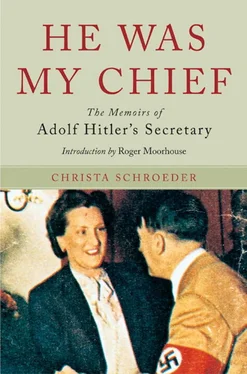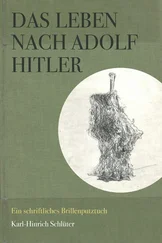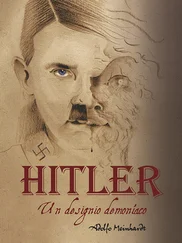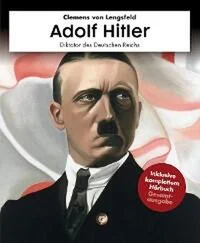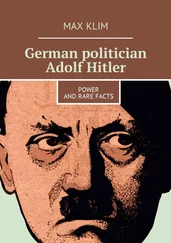Christa Schroeder - He Was My Chief - The Memoirs of Adolf Hitler's Secretary
Здесь есть возможность читать онлайн «Christa Schroeder - He Was My Chief - The Memoirs of Adolf Hitler's Secretary» весь текст электронной книги совершенно бесплатно (целиком полную версию без сокращений). В некоторых случаях можно слушать аудио, скачать через торрент в формате fb2 и присутствует краткое содержание. Город: Barnsley, Год выпуска: 2012, ISBN: 2012, Издательство: Frontline Books, Жанр: История, Биографии и Мемуары, на английском языке. Описание произведения, (предисловие) а так же отзывы посетителей доступны на портале библиотеки ЛибКат.
- Название:He Was My Chief: The Memoirs of Adolf Hitler's Secretary
- Автор:
- Издательство:Frontline Books
- Жанр:
- Год:2012
- Город:Barnsley
- ISBN:978-1-7830-3064-4
- Рейтинг книги:4 / 5. Голосов: 1
-
Избранное:Добавить в избранное
- Отзывы:
-
Ваша оценка:
- 80
- 1
- 2
- 3
- 4
- 5
He Was My Chief: The Memoirs of Adolf Hitler's Secretary: краткое содержание, описание и аннотация
Предлагаем к чтению аннотацию, описание, краткое содержание или предисловие (зависит от того, что написал сам автор книги «He Was My Chief: The Memoirs of Adolf Hitler's Secretary»). Если вы не нашли необходимую информацию о книге — напишите в комментариях, мы постараемся отыскать её.
He Was My Chief: The Memoirs of Adolf Hitler's Secretary — читать онлайн бесплатно полную книгу (весь текст) целиком
Ниже представлен текст книги, разбитый по страницам. Система сохранения места последней прочитанной страницы, позволяет с удобством читать онлайн бесплатно книгу «He Was My Chief: The Memoirs of Adolf Hitler's Secretary», без необходимости каждый раз заново искать на чём Вы остановились. Поставьте закладку, и сможете в любой момент перейти на страницу, на которой закончили чтение.
Интервал:
Закладка:
From mid December 1944 to mid January 1945 we inhabited FHQ Adlerhorst [87] Hitler left Berlin on his special train on 10 December 1944 and returned to Berlin aboard it on 16 January 1945.
and spent Christmas there. It was near Bad Nauheim, the nearest railway station was called Hunger. The FHQ consisted of small fortified huts in wooded terrain and also had subterranean bunkers. Hitler, Dara and I once stood under the trees in the open watching the great formations of Allied bombers heading into the Reich in bright sunshine. I asked the Führer: ‘Do you believe, mein Führer , that we can still win the war?’ He replied: ‘We have to.’ Dara reminded me of this conversation later and said she had wanted the ground to open up beneath her when she heard my question.
After the failure of the Ardennes offensive we returned to Berlin. At first Hitler held situation conferences in his study in the new Reich Chancellery and his meals in our Staircase Room. Since both events were later interrupted frequently by sudden air raid alarms, he then tended to remain in his bunker.
Chapter 9
The Women Around Hitler
MANY LIES HAVE BEEN presented to the world respecting Hitler’s relationships with women under this alluring heading. It may be that before and during the First World War he had sexual experiences with women. In December 1933 he contradicted my assertion, as already described, that Emilie was an ugly name by observing: ‘Don’t say that, Emilie is a lovely name, it was the name of my first sweetheart!’
In 1917 during the First World War Hitler is alleged to have deserted an eighteen-year old French girl whom he had made pregnant in France, and an illegitimate son, Jean-Marie Loret, is supposed to have been the result. The boy discovered from his mother shortly before her death the identity of his father◦– allegedly Adolf Hitler. Subsequently he attempted to establish Hitler’s paternity by genetic research at a Heidelberg institute and elsewhere.
As I have said, these two cases may be true, but it seems likely from the moment when he decided to become a politician that Hitler renounced such pleasures. For Hitler, gratification came from the ecstasy of the masses. He was erotic with the women by whom he surrounded himself, but never sexual. ‘My lover is Germany’, he emphasised repeatedly. [88] Walter Buch mentioned after the war in 1945 that Hitler had told him: ‘The lady I love is called Germania.’
Perhaps the frequently rumoured missing testicle is also true. [89] Dr von Hasselbach, one of Hitler’s official surgeons, stated after the war that Hitler had a definite aversion to showing his body, and the doctor had never seen or examined his lower regions.
When Professor Kielleutner the Munich urologist returned to Henriette von Schirach a book he had borrowed from her about the residences of well-known Munich townspeople, he told her that he had underlined in pencil the names of all the prominent people he had treated. When she read through and saw Hitler’s name underlined, she asked him: ‘What did you treat Hitler for?’ Kielleutner replied: ‘Hitler had only one testicle but I was not able to help him because he was too old.’ This happened allegedly in the 1920s. It is possible that Hitler might have been mocked by a woman, which led to his abandoning all further sexual activities.
Maser quotes Linge as saying that Hitler had perfectly normal genitalia, which Linge had seen on a picnic when both urinated against a tree. [90] Heinz Linge, Bis zum Untergang , Werner Maser (ed.), Herbig, Munich-Berlin 1980. Schroeder wrote that she considered Linge’s ‘looking at Hitler’s genitals while he was urinating’ to be a fabrication. ‘What type of wood was it that everybody used the same tree for peeing?’ she asked. ‘Who would have dared to make a point of looking at Hitler’s genitals while he was urinating?’ And in any case: ‘Every man I asked assured me that it would not be possible to catch sight of a man’s testicles in the manner stated.’
In my opinion Maser puts these words in Linge’s mouth in order to prove the possibility of the Hitler-son. Undoubtedly Hitler enjoyed the company of beautiful women and was inspired by them. He used eroticism, but not sex. Because of the great objective he had set himself and to which he was totally committed, sexual gratification occurred mentally. Emil Maurice, [91] Emil Maurice (b. 19.1.1897 Westermoor/Schleswig-Holstein, d. 6.2.1972 Starnberg). 1919 Nazi Party member No. 594 (Hitler was No. 555); from 1921 Hitler’s chauffeur; imprisoned at Lansberg with Hitler for his part in the 1923 putsch: 1925 entered SS; in December 1927 terminated friendship with Hitler following an argument over Maurice’s engagement to Geli Raubal.
Hitler’s chauffeur, told me that whenever he drove Hitler to this or that town, he◦– Maurice◦– had to search for girls for Hitler while he was engaged in conferences. Afterwards he would sit down with them and converse. He paid them, but never requested services.
The exception was Angelika ‘Geli’ Raubal, the daughter of Hitler’s half-sister Angela Raubal. He loved this girl very much but apparently did not have sex with her. Here I must correct an error in the book by Dr Wagener, Hitler aus nächster Nähe , p.98: in the apartment at Prinzregenten-Platz 16 (actually two apartments, left and right), the household was run from the outset by Frau Winter and not Frau Raubal. After moving from Thierschstrasse, [92] Hitler rented a room at Thierschstrasse 41/I from 1 May 1920 to 10 September 1929.
Hitler brought along his old landladies Frau Reichel and her mother Frau Dachs. Later Geli Raubal occupied one of these rooms. According to Ada Klein it is also incorrect for Dr Wagener to have said that Hitler would not allow Geli to perform on stage. Geli did not want to take singing lessons! Finally she allowed herself to be convinced by her uncle, who would have liked her to have become a Wagner opera singer. From 1929 this attractive lusty girl was installed in Hitler’s flat at Prinzregenten-Platz 16. He pampered her and did everything he could for her out of fondness. Geli was flattered that her famous uncle should be so devoted, but he controlled her every move and jealously fended off all her admirers. When she announced her intention to marry a painter from Linz, [93] Geli Raubal had several relationships with men whom she hoped to marry (e.g. Hitler’s chauffeur Emil Maurice in 1927). According to a statement by Geli’s mother to American CIC interrogators in 1945, the man who wrote this letter was a violinist from Linz sixteen years Geli’s senior.
Hitler convinced Geli’s mother to impose a one-year separation so that the couple should prove their love for each other. [94] Schroeder had this letter with her in internment at Augsburg and lent it to Albert Zoller who failed to return it. These passages appear in Zoller’s book and are therefore authentic.
A letter from the painter which I salvaged from Schaub’s bonfire at the Berghof in 1945 contained the following extract: [95] In fact, this extract from the letter of her unnamed fiancé must have been written long before the suicide, for Geli Raubal reached her majority at age twenty-one on 4 January 1929. Since the period of one year’s separation would fall entirely within the period when the girl was not of legal maturity, the date of the letter must have been before 4 January 1928. Whether Schroeder knew the actual date when the letter was written, and the identity of the writer, we shall never know, but if she did one must question her motives in including it at the place in the narrative where it appears. Another mystery about the letter writer is the fact that whereas Schroeder confirmed in her shorthand notes that the suitor had previously obtained the consent of Frau Raubal to her daughter’s marriage, by 1945 Frau Raubal remembered nothing of the man except that he was a ‘violinist from Linz’ sixteen years older than her daughter. The mystery of the fiancé’s identity, the miraculous saving of the letter from Schaub’s bonfire (see Chapter 15 for the full story) and its use in Schroeder’s narrative, pose some intriguing questions about Geli Raubal’s death, and the extent to which Schroeder knew the circumstances. (TN)
Интервал:
Закладка:
Похожие книги на «He Was My Chief: The Memoirs of Adolf Hitler's Secretary»
Представляем Вашему вниманию похожие книги на «He Was My Chief: The Memoirs of Adolf Hitler's Secretary» списком для выбора. Мы отобрали схожую по названию и смыслу литературу в надежде предоставить читателям больше вариантов отыскать новые, интересные, ещё непрочитанные произведения.
Обсуждение, отзывы о книге «He Was My Chief: The Memoirs of Adolf Hitler's Secretary» и просто собственные мнения читателей. Оставьте ваши комментарии, напишите, что Вы думаете о произведении, его смысле или главных героях. Укажите что конкретно понравилось, а что нет, и почему Вы так считаете.
